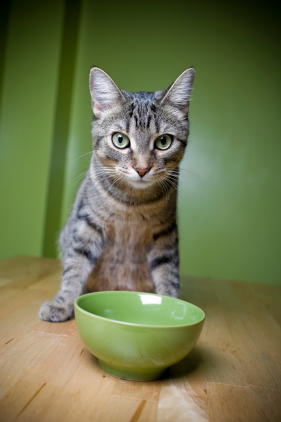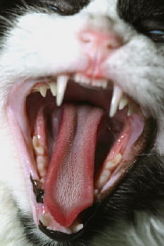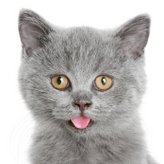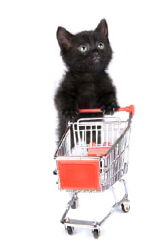Feline Taste Senses ...discriminating or finicky?

Feline taste senses ...your feline has a reputation for being “finicky” and although this is a valid observation, it is partly due to physiological factors that cause some foods to be less palatable than others. The feline taste senses use taste buds (like we do), and these reside in the surface of the tongue.
Within the taste bud a bundle of ”gustatory cells” are contained in a small spherical pocket. In your mind picture a miniscule clove of garlic…this bears a good resemblance.
The taste bud extends from an opening at the surface of the tongue through to deep within the tongue. The gustatory cells are in close contact with fine nerve endings leading into nerves within the tongue. These eventually lead to the brain.
So, the feline taste senses are really a matter of the chemicals from food (or whatever is in the mouth and saliva) interacting with the taste bud cells, stimulating the nerves and then the brain.
The feline taste senses are considered to be one of the most primitive senses; it primes the body for digestion by “getting the juices flowing,” inducing reflexes, such as the uptake of nutrients from the gastrointestinal tract.
Researchers believe that taste is tailored to nutritional need, so a cat may use its gustatory cells to choose foods containing chemicals important for their nutrition, and decline eating others.
Cats are very sensitive to certain tastes; causing them to be extremely particular about what they eat…..this can be very frustrating at times. However, some researchers claim that the feline taste senses and their feline food preferences are formed very early in life. By the time a cat is 6 months old, the dietary habits are already set.
So, if you feed your kitten only one type of food, it’s likely that’s all he will eat for the rest of his life. But if you feed a kitten a broad variety of foods, he is likely to be less picky. If you adopt cats from a shelter and/or take in strays arriving at your door like we have done……….it can be problematic finding the “comfort food” or preferences for a particular cat. Then it’s trial and error, which I can empathize with.
A stray who spent early months eating mice or bugs to survive like our Chanel did, poses special problems in finding acceptable foods since mice and bugs don’t come in cans. It has been a definite process of slowly reprogramming her eating habits.
The feline taste senses not only have this learned behavior but there are also sensory limitations. For example, cats can only taste sugar if it’s diluted in water, creating a sweet liquid. They are true carnivores. A diet of meat, bones, etc. is very low in carbohydrates; therefore, there is no evolutionary advantage to their having a preference or craving for sweets.
Cats lack the enzyme sucrose in their digestive tract, so they cannot break down sucrose or table sugar. Ingesting sucrose gives them diarrhea. So, not craving sugar may be a protective measure. If your cat craves sweet muffins, chances are she is attracted to the fat and the texture.
Unfortunately, many cats cannot resist the allure of sweet in liquid solution. This may be behind the demise of cats who lick up sweet-tasting…and deadly…antifreeze.
The feline taste senses do detect salt but as carnivores, cats don’t really need to worry about getting enough salt. Their prey provides enough for them and in fact, the feline sense of taste responds positively to the components found in blood, including salts. Cats like their meats at body temperature, and don’t seem to care if the meat is cooked or raw.
Also, cats avoid eating foods containing medium-chain triglycerides, such as those found in hydrogenated coconut oil. It is believed that this is because their lingual lipase, an enzyme in their saliva, breaks the triglycerides down into their component fatty acids, which taste bitter to the cat.
Cats also rely heavily on their sense of smell to determine whether they wish to eat something. Aroma seems to be a guiding factor in a cat’s preference for a particular food. Another factor is “mouth feel” or texture. Cats seem to have preference in size and shape of their food and they have been known to discriminate between spherical foods differing by only a fraction of an inch in size.
They are sensitive to texture and temperature. Again, this seems to relate back to the shape and texture of food they were fed when young. Oftentimes warming food will increase acceptance but it’s open to debate whether it’s a temperature preference or the enhanced odor from warmed foods.
One other factor affecting the feline taste senses and food preferences is YOU. There is some indication that cats prefer novel diets. Feral cats are opportunistic feeders, eating whatever they can catch. They don’t limit themselves to a mouse-only diet.
So if you are feeding one diet and then switching to an alternate if the cat meows, you are making the cat believe that to get a different food, even if there’s nothing wrong with the food your cat has been given, all he has to do is meow. I have run into this numerous times as each new stray starts getting integrated into the household. Once I’ve discovered the foods of preference of a particular cat, through trial and error, those foods are then rotated to keep mealtimes interesting.
If the cat decides it wants something else then it has to wait for the next mealtime, I don’t switch because of meowing. Hard, crunchy foods are available 24 hours a day so I know that no one is starving if they play the “finicky” card. However, you know your cats and their personalities. Loss of appetite is one of the most common signs of illness so if the finicky behavior isn’t normal, consult your veterinarian.
Related Articles......
Return from Feline Taste Senses to Cat Health Homepage
Having trouble finding what you need? Cat Health Index & Site Map
OR
Do you have a question to ask?...Questions
OR
Do you have a cat story to share?...Simply click here to go to that page!
Copyright@2010-2020 All rights reserved.Cat-health-detective.com
This website is information only. Consult a veterinarian for medical assistance

"Like Us" on Facebook
or...
"Like Us" here




















